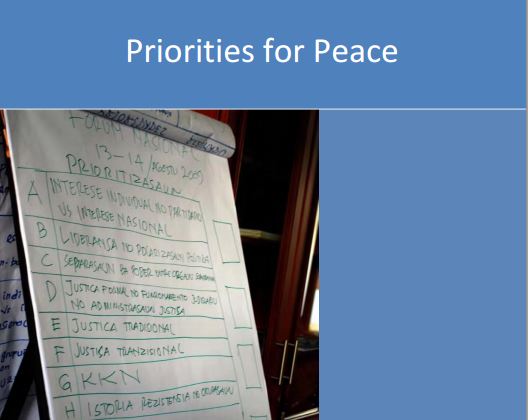Local Timorese voices on the obstacles that stand in the way of lasting peace

This latest report from Timor-Leste synthesizes the key findings from a nation-wide consultation process and identifies the main obstacles that stand in the way of lasting peace. It provides the basis for continued work in Timor-Leste on addressing priority obstacles to the consolidation of peace.
The full report captures the energy, enthusiasm, stories, ideas and unique analysis of current challenges relating to peace as seen by Timorese today.
Read the full report.
Events of 2006 revealed the true fragility of Timorese society
This peacebuilding initiative began in Timor-Leste in response to the violent crisis of 2006. This period of unrest revealed the fragility of the young nation and the challenges it is facing in healing the wounds of the past whilst struggling to adopt a new system of state structures.
Working to contributing to a climate of change
The Programme of Research and Dialogue for Peace (PRDP), the joint initiative between Interpeace and the Centre of Studies for Peace and Development (CEPAD) in Timor-Leste seeks to contribute to the creation of a climate in which the people of Timor-Leste are better able to identify priority issues impeding the establishment of a lasting peace, understand the origins and the dynamics of conflict and address these together in a non-violent and durable manner.
Nationwide consultations
From 2008-2009 the Programme of Research and Dialogue for Peace (PRDP) conducted consultations throughout the 13 Districts of Timor-Leste. Aimed at identifying peace-related issues as analyzed by Timorese society facilitated discussions were carried out, which was inspired by the Interpeace approach. District focus group discussions and regional conferences followed to set 33 priorities that provided the agenda for the National Forum and the content of this report.
Issues divided into four thematic groups
The issues were divided into 4 thematic groups: Politics, Justice, Social and Economic issues.
Results of the findings provided helped set the national peacebuilding agenda
The results of the consultation process, gathered in this document, were presented at a National Forum in 2009. This event brought together over 200 representatives from all sectors of Timorese society, including the leadership of the four sovereign bodies of the state and representatives from academia, the church, the International Community, NGOs and delegations from each of the 13 districts. During the two day meeting participants debated the findings and developed the main conclusions for this report. Participants selected the following issues as the most important obstacles to peace in Timor-Leste:
1. The promotion of individual and party interests over the national interest.
2. The ineffective formal judicial system and the culture of impunity.
3. Conduct a thorough historical review of the resistance and the occupation.
4. Corruption, Collusion and Nepotism.
Towards sustainable peace
PRDP is now entering into a second phase that will seek to engage Timorese society on the top priority issues identified during the National Forum in order to use a Timorese lens to formulate solutions so contributing to the consolidation of peace that is locally owned and sustainable.
